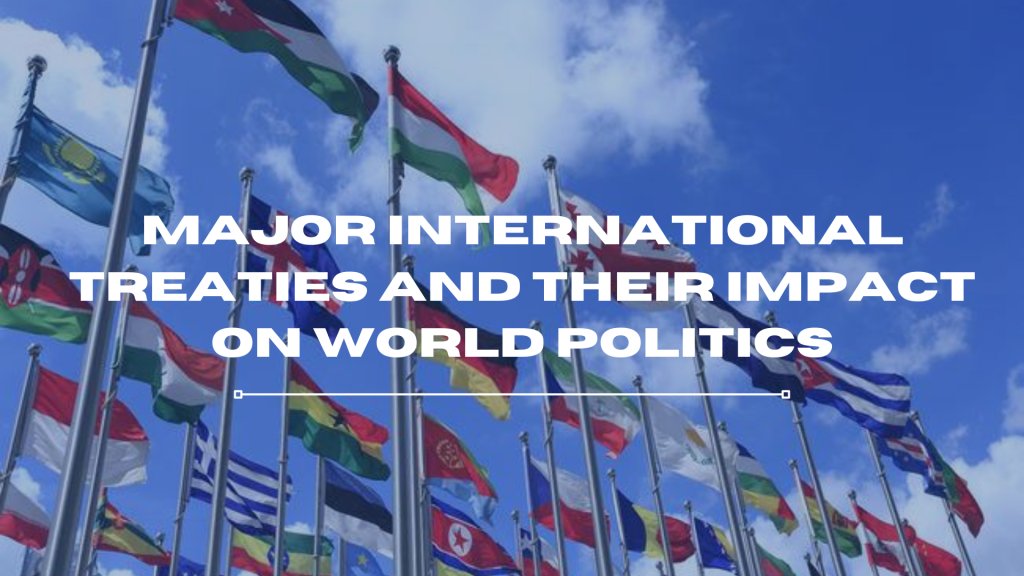International treaties are formal, legally binding pacts between nations that have a significant role in determining global politics, policy on the economy, and ensuring peace and security. International treaties form the legal and diplomatic basis of international relations, setting out how states interact, settle disputes, and cooperate on pressing global problems. Over history, a number of seminal treaties have significantly influenced world relations. Others have forestalled wars, while others have tackled universal challenges like nuclear disarmament and climate change. In this blog, we will examine some of the most influential international treaties that have shaped global politics and continue to impact the contemporary world.

Significant Treaties in World History
Take a close look at some of the significant treaties in world history.
The Treaty of Westphalia (1648)
The Treaty of Westphalia concluded the Thirty Years’ War in Europe and established the foundations for the contemporary nation-state system. It also formulated the theory of national sovereignty, which stresses that no state must intervene in the domestic affairs of another state. This idea has been a mainstay of international relations up to the present time, influencing diplomatic policies globally. By defining the sovereignty of states, the Treaty of Westphalia reformed the European balance of power and set the precedent for modern international law.
The Treaty of Versailles (1919)
The Treaty of Versailles, signed at the end of World War I in 1919, was intended to create lasting peace but instead planted the seeds of future war. The treaty levied harsh reparations against Germany, crippling its economy and constraining its military potential. A number of new states were formed from the ruins of defeated empires, resulting in ethnic conflicts and border disputes. This reorganization, especially in Central and Eastern Europe, brought about instability and provided the groundwork for World War II. Another significant consequence was the formation of the League of Nations, which was intended to prevent future wars through diplomacy and collective security.
The United Nations Charter (1945)
The United Nations (UN) was formed in 1945 following World War II to advance world peace, security, and cooperation. The UN’s greatest contribution has been its function as a world governing institution for the preservation of global security and resolution of conflicts. It established structures for delivering humanitarian assistance, aiding sustainable development, and addressing global crises like natural disasters and displacement of refugees. Through its promotion of human rights, equal governance, and social development, the UN has conditioned international politics and continues to direct global security, development, and diplomatic policies.
The North Atlantic Treaty (1949)
The 1949 signing of the North Atlantic Treaty resulted in the establishment of the North Atlantic Treaty Organization (NATO), a military bloc coalition of the United States, Canada, and various European countries. NATO was formed as a collective defense system to resist the increasing power of the Soviet Union during the Cold War. NATO influenced world politics by solidifying democratic country alliances and determining Cold War policy. NATO even after the Cold War kept evolving to address international security issues, increasing its membership and engaging in peacekeeping operations, counterterrorism, and crisis management.
The Treaty on the Non-Proliferation of Nuclear Weapons (NPT) (1968)
The Treaty on the Non-Proliferation of Nuclear Weapons (NPT), which was signed in 1968 and came into force in 1970, is a historic global treaty aimed at preventing the nuclear proliferation of nuclear weapons, supporting the peaceful utilization of nuclear power, and urging worldwide disarmament. Though nuclear powers such as the United States, Russia, China, France, and the United Kingdom kept their arsenals, the treaty dissuaded other nations from acquiring nuclear weapons. The NPT also encouraged diplomatic talks on disarmament, resulting in deals like the Iran Nuclear Deal and arms reduction treaties between the major powers such as the U.S. and Russia.
The Paris Agreement (2015)
The Paris Agreement, which was adopted in 2015 under the United Nations Framework Convention on Climate Change (UNFCCC), is a historic international agreement with the objective of addressing climate change through mitigating greenhouse gas emissions. It aims to keep global warming below 2°C over pre-industrial levels and pursue efforts to limit it to 1.5°C above pre-industrial levels. The pact has also provided a framework for climate financing by rendering economic and technological assistance to developing countries to enable them to adapt to climate change and mitigate their emissions.
The African Continental Free Trade Area (AfCFTA) (2018)
The African Continental Free Trade Area (AfCFTA), created in 2018, is a history-making treaty that aims to establish a single market for products and services in Africa. It seeks to increase intra-African trade by lowering tariffs, removing barriers to trade, and promoting economic integration among African states. The treaty has immensely deepened Africa’s economic standing in world trade and made the continent more competitive in foreign markets. By promoting economic cooperation, the AfCFTA has helped to enhance regional stability, industrialization, and employment.
Summing Up
International treaties have been instrumental in molding world politics, shaping diplomatic relations, and resolving global issues. Whether peace, security, economy, or environment, these treaties continue to inform international relations. For students undergoing competitive exams, knowledge of these treaties offers vital information on global governance, international law, and diplomatic tactics. A clear understanding of these historical agreements will not only improve general knowledge but also help to respond to questions regarding current affairs, history, and political science with ease.
ixamBee specializes in providing expert guidance and resources for banking exams 2024, ensuring that you are well-prepared for the Upcoming Bank Exams like RBI Grade B, NABARD Grade B, IBPS SO, and more. Our courses align with the bank exam calendar 2024, covering all the essential topics. With a focus on the upcoming bank jobs, our Previous Year Papers, BeePedia, SSC CGL, SSC CHSL, SSC MTS and other Mock Tests are designed to help you excel in upcoming banking exams.
Also Read:
International Trade Agreements: RCEP, USMCA, and Indo-Pacific Deals
National Symbols of India 2024: Learn Their Meaning and Significance
International Trade Agreements: RCEP, USMCA, and Indo-Pacific Deals